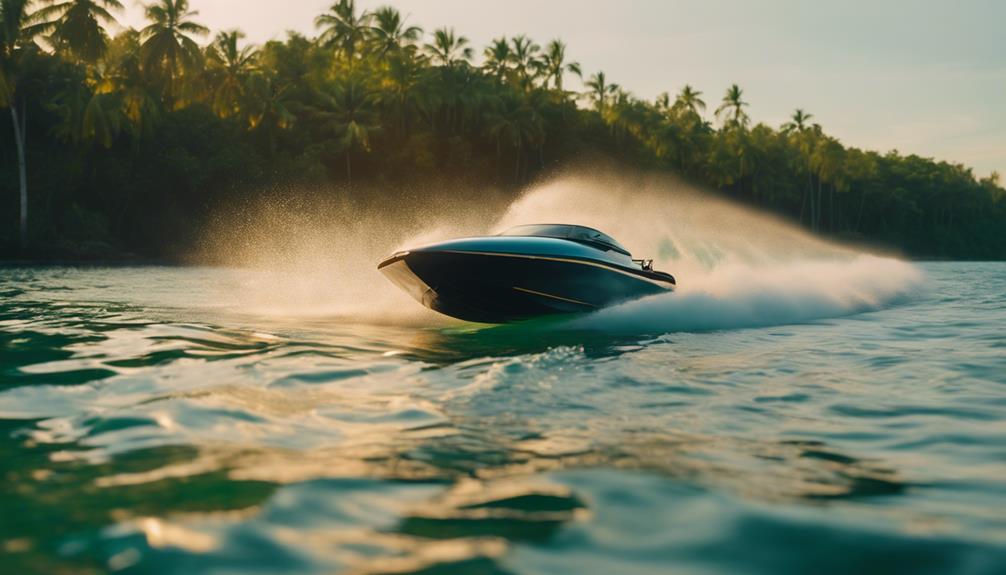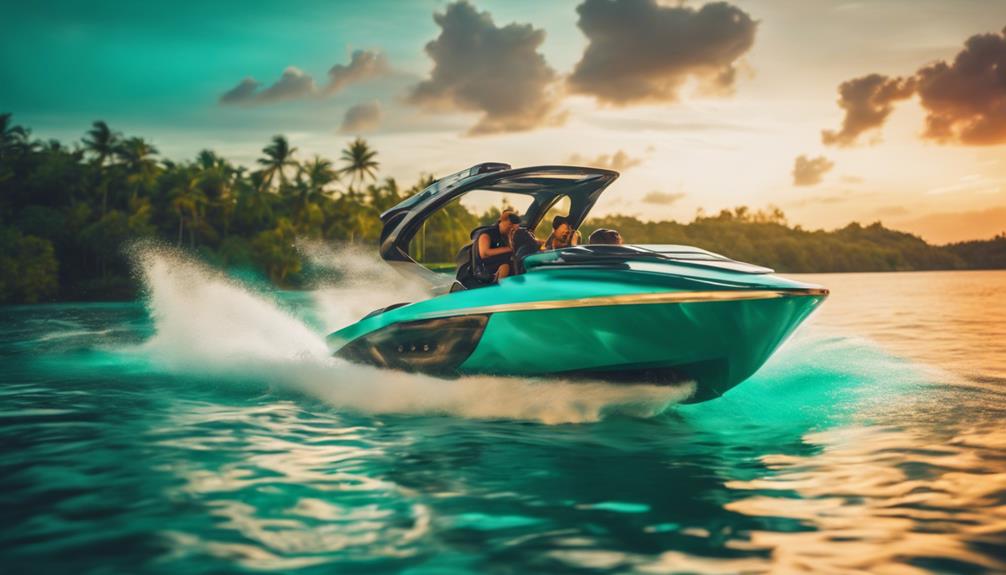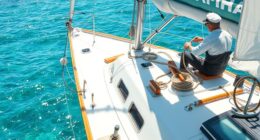When comparing jet boats and propeller boats, it really depends on what you need. Jet boats shine in shallow water and offer speedy thrills, making them perfect for activities like tubing or water skiing. They also reduce injury risks since there's no exposed propeller. However, propeller boats excel in fuel efficiency and stability, especially during long trips or in choppy waters. They're easier to maintain and repair too. Ultimately, your choice hinges on your preferences for speed versus stability. Stick around, and you'll uncover more insights about each type of boat and their best use cases.
Key Takeaways
- Jet boats excel in shallow water navigation and quick acceleration, making them ideal for recreational activities like water sports.
- Propeller boats offer better fuel efficiency and stability in rough waters, making them suitable for long-distance travel and commercial use.
- Jet boats have reduced injury risks due to no exposed propellers, while propeller boats pose higher injury risks from spinning propellers.
- Maintenance and repair are generally easier and less costly for propeller boats, whereas jet boats require specialized knowledge and frequent upkeep.
Overview of Jet Boats and Propeller Boats
When comparing jet boats and propeller boats, you'll find that each type offers unique advantages tailored to different boating experiences.
Jet boats utilize a propulsion system that powers a jet pump, pushing water through a nozzle to create thrust. This design makes them particularly suited for shallow water navigation, allowing you to explore areas that might be off-limits for traditional boats. They excel in quick acceleration and maneuverability, perfect for recreational activities like water skiing or tubing.
On the other hand, propeller boats operate by driving a propeller with an engine. This setup generally provides better fuel efficiency over longer distances, making them ideal for extended trips. They offer more stability in choppy waters, ensuring a smoother ride when conditions aren't calm. However, keep in mind that propeller boats are more susceptible to debris in the water, which can affect their performance.
Both types have their safety considerations, with jet boats minimizing injury risks from spinning blades due to their lack of external propellers. Understanding these differences can help you choose the right type of boat for your specific needs and preferences.
Performance Comparison
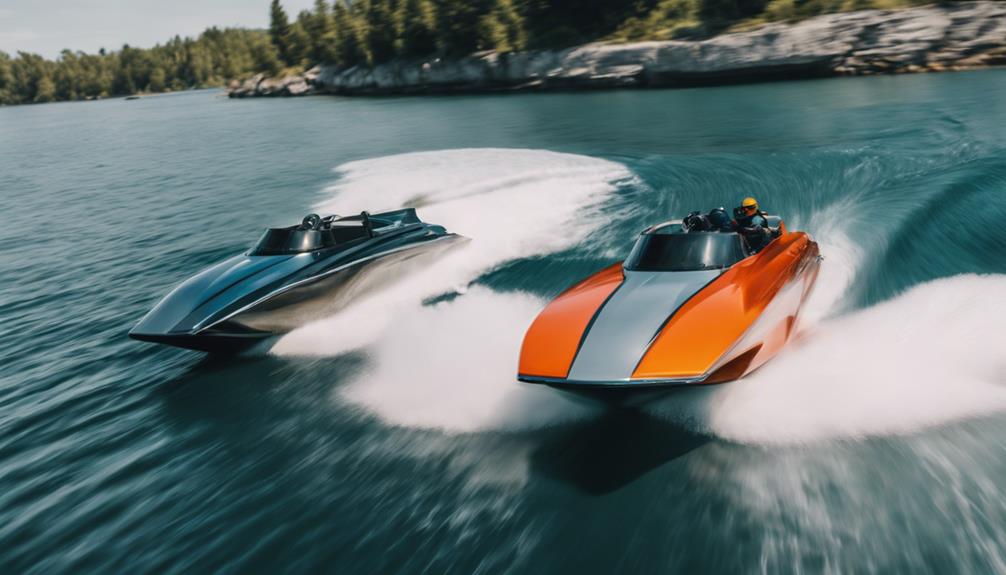
Jet boats outperform propeller boats in speed and agility, making them the go-to choice for adrenaline-seeking enthusiasts. With their jet propulsion systems, jet boats achieve quicker acceleration and higher top speeds, allowing you to experience thrilling rides.
However, when it comes to fuel efficiency over longer distances, propeller boats take the lead. They maintain a consistent speed and are better suited for extended travel on larger bodies of water.
While jet boats excel in shallow waters, their performance can be hindered due to lower steering control at slow speeds. You'll find that jet boats require thrust for maneuverability, which can be a drawback in tight situations.
On the other hand, propeller boats offer predictable handling, making them easier to control when speeds drop. If you're steering through murky or debris-laden environments, propeller boats also provide an advantage. They can handle these conditions better than jet boats, which can suffer engine damage when encountering debris.
Ultimately, if you crave excitement in shallow waters, jet boats are your best bet, while propeller boats are more reliable for stability and comfort during longer journeys.
Safety Considerations
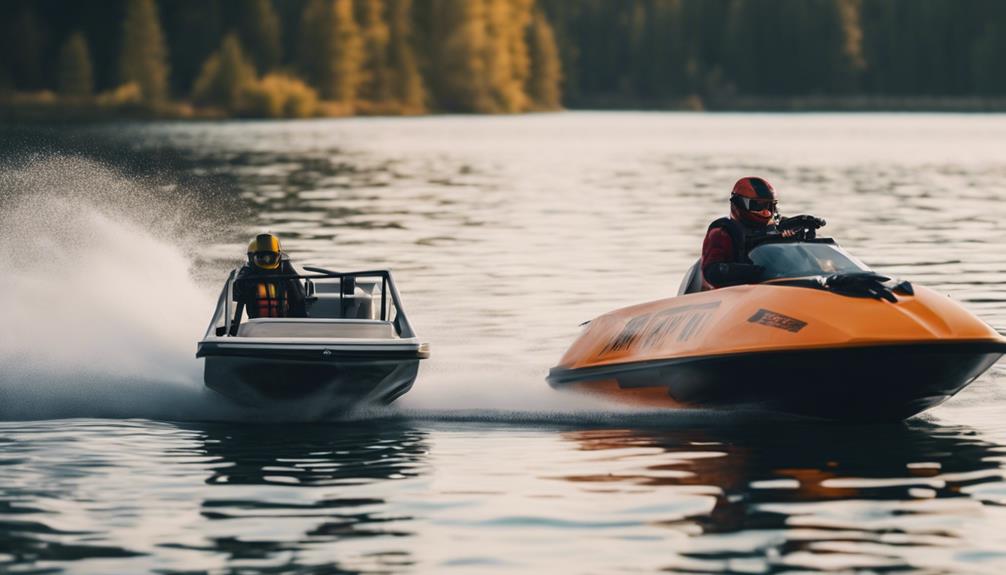
While performance is important, safety considerations play a vital role in choosing between jet boats and propeller boats.
Jet boats are generally safer due to their design; they don't have exposed propellers, greatly reducing injury risk for swimmers and passengers. This makes them a better option if you plan to have people in or around the water. However, keep in mind that jet boats can wander when you reduce throttle, which may complicate low-speed maneuvering in crowded areas.
On the other hand, propeller boats carry a higher injury risk. If someone comes into contact with the spinning propeller, the consequences can be severe. You'll need to manage entry and exit carefully to avoid accidents.
When it comes to operating in shallow waters, jet boats have an advantage as they can navigate with minimal depth without damaging a propeller. Propeller boats, conversely, are prone to sustaining damage in these conditions.
Additionally, if a propeller becomes fouled, you might have to stop the engine and enter the water to clear debris, introducing yet another safety risk.
Ultimately, understanding these safety considerations can help you make a more informed choice.
Maintenance and Repair

Understanding the maintenance and repair needs of your boat is essential for ensuring its longevity and performance.
When comparing jet boats and propeller boats, you'll find that maintenance requirements differ considerably. Jet boats demand specialized knowledge for repairs, which can make finding qualified mechanics more challenging. This lack of accessibility can lead to higher upkeep costs, as you may have to pay a premium for expertise.
Additionally, jet boats often have complex systems that require more frequent maintenance than the simpler designs of propeller boats. You might encounter issues like clogged pump intakes from debris, necessitating manual cleaning.
On the other hand, propeller boats usually allow for easier clearing and have lower maintenance costs due to the availability of parts and mechanics.
User Preferences and Applications
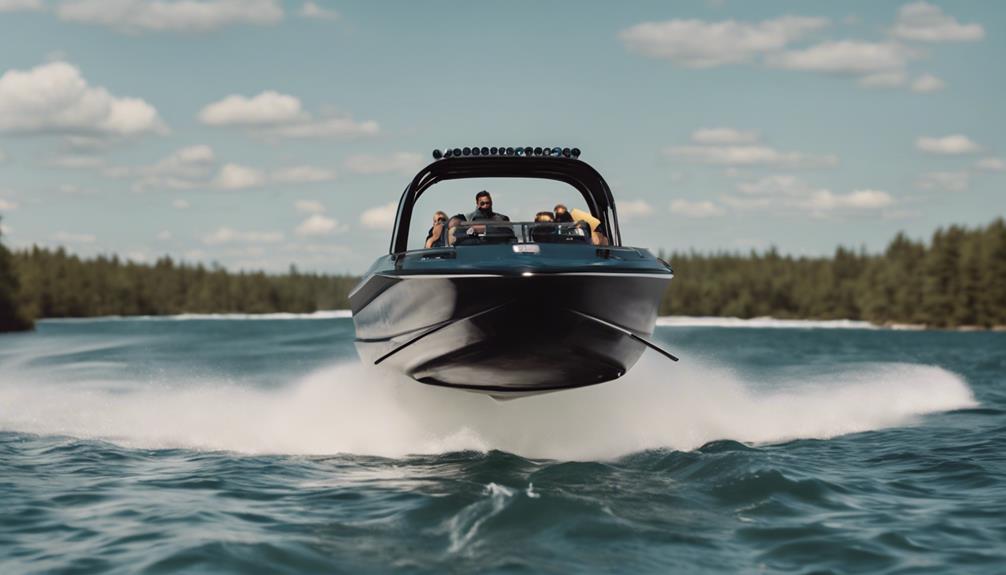
When choosing between jet boats and prop boats, it really comes down to your specific needs and activities.
If you're into high-speed water sports or maneuvering through shallow areas, a jet boat might be your best bet.
On the other hand, if you're planning long fishing trips or cruising in rough waters, a prop boat offers the stability and efficiency you'll appreciate.
Ideal Use Cases
Jet boats shine in scenarios where quick maneuvers and shallow waters are essential, making them the go-to choice for water sports like skiing and tubing. If you're looking for a thrilling ride and want to navigate tight spaces, jet boats are your best bet.
Here are some ideal use cases for both types of boats:
- Water Sports: Jet boats excel in activities like water skiing and tubing, offering fantastic maneuverability and quick acceleration.
- Shallow Water Navigation: If you frequent lakes or rivers with shallow drafts, jet boats can easily glide through without the risk of propeller damage.
- Fishing in Deeper Waters: Propeller boats are perfect for fishing trips, providing better fuel efficiency and stability in rougher conditions.
- Commercial Operations: If you're in the market for ferry services or water taxis, propeller boats offer the reliability needed for long-distance cruising.
Ultimately, your choice will depend on your specific needs. If adrenaline and agility are your priorities, jet boats are the way to go. For fuel efficiency and stability in various conditions, propeller boats might be your best option.
Recreational Versatility
Recreational versatility is key to choosing between jet boats and prop boats, as each caters to different user preferences and specific water activities.
If you're a thrill-seeker or a fan of water sports, jet boats might be your best bet. Their high acceleration and agility make them perfect for activities like water skiing and tubing. Plus, they excel in shallow waters, allowing you to access rivers and small waterways that propeller boats can't reach.
On the other hand, if you enjoy fishing or long-distance cruising, propeller boats could be more suitable for you. They offer better fuel efficiency and stability in rough waters, making them ideal for a variety of recreational activities. Propeller boats are also versatile enough for commercial applications, providing reliable performance across different water conditions.
Ultimately, your choice depends on how you plan to use the boat. If your focus is on exciting water sports and maneuvering tight spaces, go with a jet boat. But if you prefer practicality and efficiency for everyday adventures, a propeller boat might be the way to go.
Advantages and Disadvantages
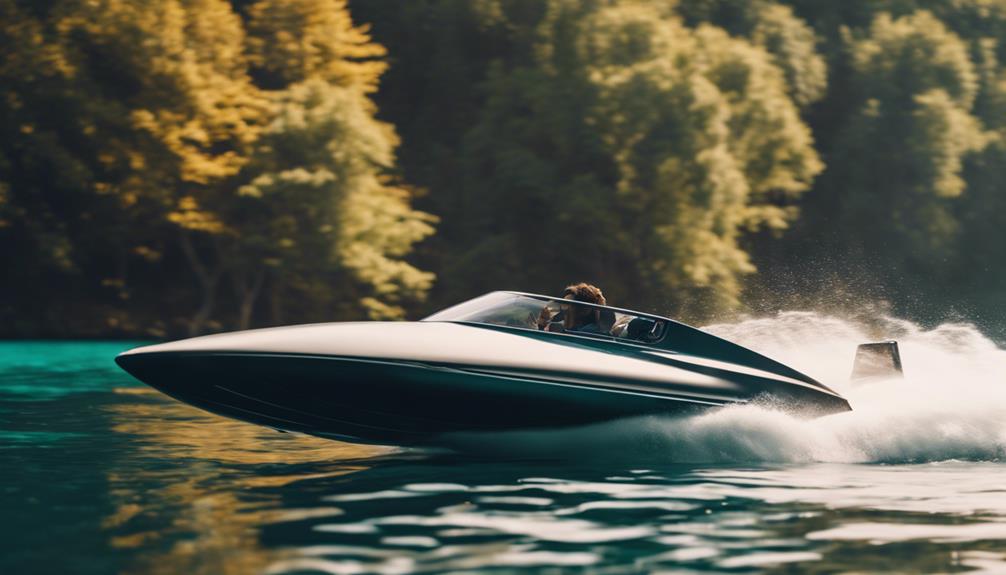
Steering the pros and cons of jet boats and propeller boats reveals distinct advantages and disadvantages that cater to different boating preferences and conditions. Here's a quick breakdown to help you decide:
- Jet Boats Advantages:
- Excellent for shallow water navigation, operating in depths as low as inches.
- No exposed propellers reduce injury risk and maintenance costs.
- Jet Boats Disadvantages:
- Susceptible to impeller damage from debris, which can be costly.
- Perform poorly in rough seas, compromising stability and control.
- Propeller Boats Advantages:
- Offer excellent fuel efficiency, making long-distance travel more economical.
- Smooth handling is ideal for various activities like fishing and cruising, especially in rough conditions.
- Propeller Boats Disadvantages:
- Fixed propeller positions increase the risk of damage in shallow waters.
- Can experience cavitation at high speeds, leading to increased noise and vibrations.
Understanding these advantages and disadvantages can help you choose between jet boats and propeller boats based on your boating style and the conditions you expect to encounter.
Environmental Impact and Comfort

When you consider environmental impact, jet boats stand out for their lower noise levels and reduced risk to marine life, making them a safer choice for delicate ecosystems.
You'll also notice that jet drives offer a smoother ride with less onboard noise, enhancing your comfort on the water.
These factors make jet boats an appealing option for both the environment and passenger experience.
Marine Life Preservation
How do jet boats contribute to marine life preservation while enhancing passenger comfort? Jet propulsion systems have several advantages over traditional propeller boats that make them more environmentally friendly.
Here are a few key benefits:
- Lower Underwater Noise: Jet boats produce less underwater noise, minimizing disturbance to marine life, especially in delicate ecosystems like coral reefs.
- Reduced Injury Risks: Without exposed propellers, there's a considerably lower risk of injuring swimmers or marine animals, including endangered species like manatees.
- Shallow Water Operation: Jet boats can navigate in shallow waters, allowing access to critical fish breeding areas without causing ecological damage.
- Lower Emissions: Their design promotes lower emissions and reduced fuel consumption, leading to a smaller ecological footprint during boating activities.
Passenger Comfort Levels
While jet boats play a significant role in marine life preservation, they also excel in providing a comfortable experience for passengers. Compared to propeller boats, jet boats offer significant advantages in passenger comfort levels. One of the main benefits is their reduced vibrations and noise, creating a more enjoyable ride.
| Aspect | Jet Boats | Propeller Boats |
|---|---|---|
| Vibrations | Minimal vibrations | Noticeable vibrations |
| Noise | Lower on-board noise | Higher noise levels |
| Stability | Better in rough weather | Generally stable, but can experience cavitation at high speeds |
Jet boats operate with higher rotational speeds, which minimizes vibrations—allowing you to enjoy a smoother journey. They also produce lower underwater noise signatures, enhancing the overall experience. Additionally, their design contributes to better stability in challenging conditions, making your adventure more pleasant.
On the other hand, propeller boats can create annoying noise and vibrations, especially at higher speeds. As a result, if passenger comfort levels are your priority, jet boats clearly stand out as the better choice.
Design Considerations and User Experiences

Jet boats are designed for agility and performance in shallow waters, which makes them a favorite among thrill-seekers, whereas propeller boats provide stability and versatility for a broader range of activities.
When considering design and user experiences, each type of boat has its strengths:
- Jet Boats: Their compact engine design results in lighter weight, enhancing performance and ease of towing. They excel in shallow waters, allowing you to explore areas where propeller boats can't go.
- Maneuverability: Jet boats offer high-speed agility, making them perfect for tight spaces and quick turns, appealing to water sports enthusiasts craving excitement.
- Propeller Boats: These boats come in various sizes and designs, suitable for fishing, cruising, and water sports, catering to a diverse range of user needs.
- User Experiences: Many propeller boat users appreciate their predictable handling, especially for longer distances and stability in rough conditions, making them ideal for recreational cruisers and commercial operators.
Ultimately, your choice between jet boats and propeller boats will hinge on your intended activities and your desire for agility or stability in your water adventures.
Frequently Asked Questions
Is a Jet Boat Better Than a Prop Boat?
When considering if a jet boat's better, think about your needs. Jet boats excel in shallow waters and offer speed, but if you value fuel efficiency and versatility, a prop boat might suit you better.
What Are the Downsides of Jet Boats?
Imagine gliding over glassy water, only to hit a snag. Jet boats can clog easily, struggle with low-speed maneuvering, guzzle fuel, and challenge you in reverse, making them less forgiving than you might expect.
How Efficient Is a Water Jet Compared to a Propeller?
When you compare a water jet to a propeller, you'll find that jets often lack efficiency at lower speeds, consuming more fuel for high speeds, while propellers generally provide better fuel economy over longer distances.
Are Jet Boats More Efficient?
When you glide across the water's surface, jet boats aren't more efficient. Their design often leads to higher fuel consumption, especially at high speeds, making propeller systems a better choice for overall economy and performance.
Conclusion
In the end, whether you choose a jet boat or a prop boat really depends on your needs and preferences.
Jet boats zip through shallow waters like a cheetah on the hunt, while prop boats offer a smooth ride on deeper lakes.
Consider factors like performance, safety, and maintenance before making your decision.
Ultimately, both types have their perks and pitfalls; it's all about finding the perfect fit for your aquatic adventures!

